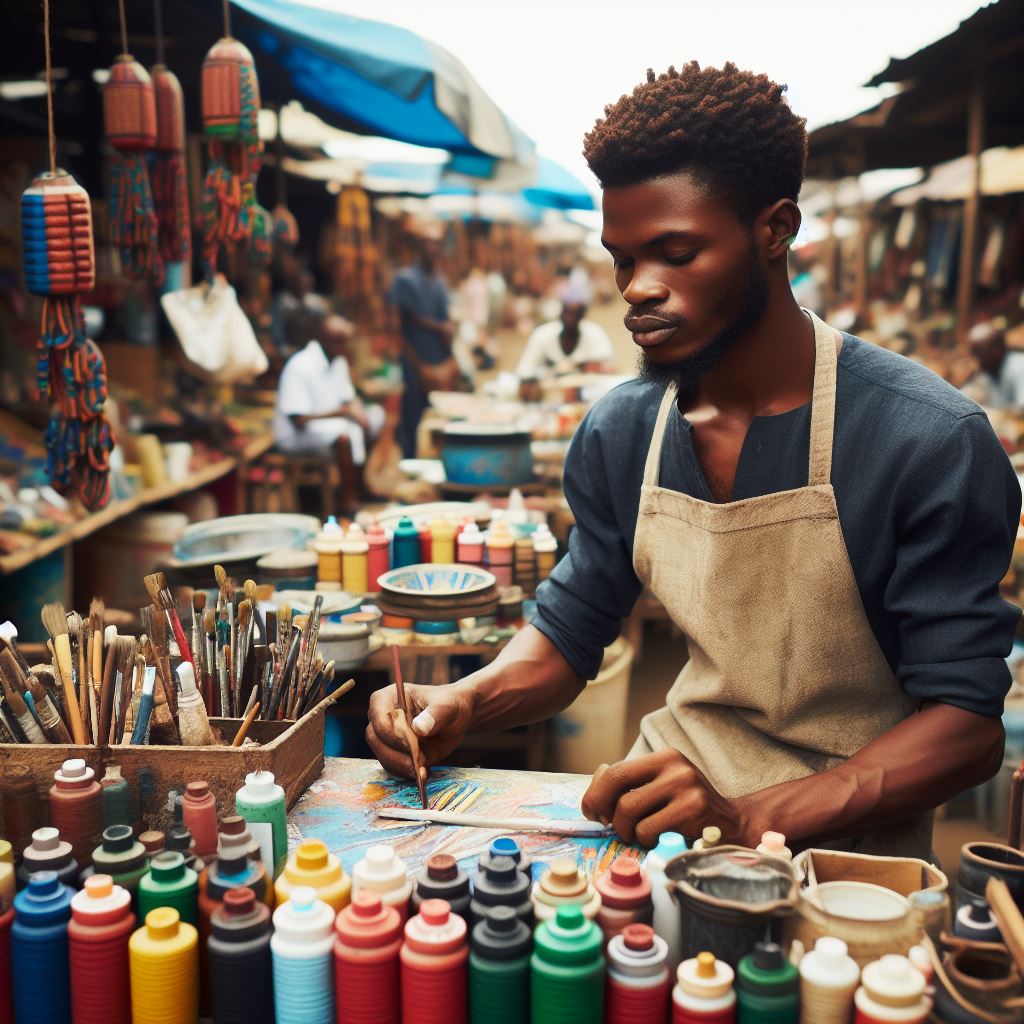Introduction
Traditional Nigerian pottery boasts a rich cultural heritage, showcasing the nation’s artistic and utilitarian craftsmanship.
However, traditional pottery making in Nigeria has significantly declined in recent decades.
Modernization, urbanization, and the allure of mass-produced goods have overshadowed these ancient practices.
Reviving traditional Nigerian pottery is crucial for preserving cultural identity and heritage.
Traditional pottery is not just an art form; it embodies historical and cultural narratives passed down through generations.
The intricate designs and unique techniques reflect the diverse ethnic groups across Nigeria.
However, the rapid shift towards industrialization has marginalized these artisans, leading to a decline in traditional pottery practices.
The importance of reviving traditional Nigerian pottery extends beyond cultural preservation.
It offers economic opportunities for artisans, enabling them to sustain their livelihoods and support their communities.
Furthermore, traditional pottery practices promote sustainable and eco-friendly methods, contrasting the environmentally damaging mass production processes.
Moreover, this revival can inspire contemporary artists, blending old techniques with modern aesthetics.
This fusion can lead to innovative art forms that resonate on both local and global stages. Supporting traditional pottery fosters community pride, strengthening social bonds and ensuring that these centuries-old traditions are not lost to time.
History of Nigerian Pottery
The art of pottery making in Nigeria dates back thousands of years, with evidence of ceramic vessels and clay sculptures found in archaeological sites across the country. This rich tradition has been integral to the cultural heritage of various ethnic groups in Nigeria.
The Rich History of Pottery Making
Nigerian pottery is characterized by its unique designs, intricate patterns, and diverse styles that reflect the artistic prowess of the craftsmen. The techniques and skills passed down through generations have contributed to the development of distinct regional pottery traditions.
Ethnic Groups Known for Their Pottery Traditions
- The Igbo people of southeastern Nigeria are renowned for their elaborate clay pots, which are used for storing water, palm wine, and food.
- The Hausa people in the northern region are skilled in creating functional pottery pieces such as cooking pots, bowls, and water containers.
- The Yoruba people in the southwestern part of Nigeria are known for their decorative pottery adorned with intricate designs and motifs.
Importance of Preserving These Cultural Practices
Preserving traditional Nigerian pottery is essential for maintaining cultural identity, promoting artistic heritage, and fostering a sense of pride among local communities.
By revitalizing these age-old practices, we can ensure the continuity of our cultural heritage for future generations.
Basically, reviving traditional Nigerian pottery is not just about preserving ancient techniques and artistry but also about celebrating the diversity and richness of our cultural heritage.
It is a testament to the creativity, skill, and ingenuity of the Nigerian people, and it serves as a reminder of our enduring connection to our past. Let us continue to honor and uphold the legacy of Nigerian pottery for generations to come.
Read: Research Areas in African and Asian Studies
Challenges facing traditional Nigerian pottery
Traditional Nigerian pottery has a rich cultural significance and heritage, but it faces numerous challenges in the modern world.
- Traditional pottery making has declined due to modernization and changing consumer preferences.
- Impact of modernization on traditional pottery making has led to a loss of traditional techniques and skills.
- Technological advancements have made it easier to mass-produce pottery, reducing the demand for handmade pieces.
- Younger generations are less interested in learning traditional pottery making skills, opting for more modern careers.
The impact of modernization on traditional pottery making
- Modernization has introduced new materials and techniques, making traditional methods seem outdated.
- Traditional pottery making is labor-intensive and time-consuming, discouraging younger generations from pursuing it.
- The demand for traditional pottery has decreased as consumers prefer mass-produced, factory-made products.
- Lack of government support and funding for traditional pottery artisans has also hindered their ability to compete with modern producers.
The lack of interest among the younger generation
- Youth are more interested in modern careers that offer higher pay and better job prospects.
- Traditional pottery making is seen as a laborious and low-paying profession by the younger generation.
- The lack of exposure to traditional pottery making at a young age contributes to the disinterest among youths.
- Social media and technology have shifted the focus away from traditional arts and crafts, further reducing interest.
Limited access to resources and markets for pottery makers
- Traditional pottery makers often lack access to modern tools and equipment needed to compete in the market.
- High production costs and limited access to quality raw materials further constrain traditional pottery makers.
- Geographical barriers prevent pottery makers from reaching wider markets and expanding their customer base.
- Traditional pottery making communities often operate in remote areas with poor infrastructure and limited market opportunities.
In review, reviving traditional Nigerian pottery requires addressing the challenges of modernization, lack of interest among the younger generation, and limited access to resources and markets.
By promoting awareness, providing support, and preserving heritage, traditional pottery making can thrive once again.
Read: Exploring Semiotics in Communication Arts
Initiatives to revive traditional Nigerian pottery
Government efforts
The Nigerian government has recognized the importance of preserving traditional pottery.
They have allocated funds for the promotion and preservation of the art form.
Government-sponsored workshops and training programs have been established to train young potters.
Non-governmental efforts
Various non-governmental organizations have also taken steps to revive traditional Nigerian pottery.
These organizations work closely with local communities to promote and preserve the art.
They organize exhibitions and events to showcase the talents of traditional potters.
Workshops and training programs
Workshops and training programs play a crucial role in reviving traditional Nigerian pottery.
They provide aspiring potters with the skills and knowledge needed to carry on the tradition.
Experienced traditional potters serve as mentors and teachers in these programs.
Exhibitions promoting the art
Exhibitions serve as platforms to display the beauty and significance of traditional Nigerian pottery.
They attract art enthusiasts and collectors who appreciate the cultural value of the art form.
Exhibitions also help traditional potters gain recognition and support for their work.
Importance of community involvement
Community involvement is essential in preserving pottery traditions in Nigeria.
Local communities hold the knowledge and expertise required to maintain the art form.
By engaging with the community, traditional potters can pass down their skills to future generations.
In general, reviving traditional Nigerian pottery requires a collaborative effort between the government, non-governmental organizations, local communities, and artists.
Through workshops, training programs, exhibitions, and community involvement, the rich heritage of Nigerian pottery can be preserved and celebrated for years to come.
Read: Cultural Exchange Between Nigeria and China

Explore Further: Top Careers in Translation and Interpretation in Nigeria
Benefits of Reviving Traditional Nigerian Pottery
Economic Benefits for Local Artisans and Communities
Reviving traditional Nigerian pottery can have significant economic benefits for local artisans and communities.
By engaging in pottery production, artisans can generate income to support their families and improve their standard of living.
This economic activity creates job opportunities within the community, reducing unemployment rates and boosting the local economy.
Additionally, the sale of traditional Nigerian pottery can contribute to the overall economic development of the region, attracting investments and increasing revenue for both artisans and local businesses.
Preservation of Cultural Heritage and Identity
One of the most important benefits of reviving traditional Nigerian pottery is the preservation of cultural heritage and identity.
Pottery has been an integral part of Nigerian culture for centuries, reflecting the rich history and traditions of the country.
By revitalizing traditional pottery techniques and designs, artisans can ensure that this cultural legacy is passed down to future generations.
Moreover, pottery serves as a tangible link to Nigeria’s past, celebrating the unique customs and practices of its diverse ethnic groups.
This preservation of cultural heritage helps to strengthen national pride and foster a sense of belonging among Nigerians.
Potential for Tourism and Cultural Exchange
Reviving traditional Nigerian pottery also holds great potential for tourism and cultural exchange. Pottery-making has always been a fascinating craft that attracts visitors from around the world.
Tourists are often eager to learn about the traditional techniques and artistic styles used in Nigerian pottery production.
By promoting this cultural heritage, Nigeria can attract more tourists, boosting its tourism industry and generating revenue for the country.
Additionally, pottery can serve as a medium for cultural exchange, allowing artisans to share their skills and knowledge with international counterparts.
This exchange of ideas and techniques can further enrich the artistic community and promote cross-cultural understanding.
Read: How to Open a Beauty Salon in Nigeria: Step-by-Step
Uncover the Details: Career Paths in Nigerian TV Production Industry
Strategies for promoting traditional Nigerian pottery
Encouraging young people to learn pottery making skills
One key strategy for reviving traditional Nigerian pottery is to encourage young people to learn pottery making skills.
By introducing pottery classes in schools and community centers, we can pass down this ancient art form to the next generation.
It is essential to showcase the beauty and cultural significance of Nigerian pottery to attract young individuals to take an interest in learning this traditional craft.
Additionally, organizing workshops and apprenticeship programs can provide hands-on training and mentorship opportunities for aspiring potters.
Creating markets and outlets for traditional pottery products
In order to promote traditional Nigerian pottery, it is crucial to create markets and outlets where artisans can sell their products.
This can include setting up pottery showcases at local markets, organizing pottery fairs and exhibitions, and establishing online platforms to reach a wider audience.
By providing artisans with opportunities to showcase and sell their work, we can create a sustainable market for traditional pottery products and generate income for the artisans.
Collaborating with artists, designers, and other stakeholders to promote traditional pottery
Another effective strategy for promoting traditional Nigerian pottery is to collaborate with artists, designers, and other stakeholders in the art and culture sector.
By partnering with creative individuals who can help reframe traditional pottery in a contemporary context, we can attract a new audience and generate interest in this ancient craft.
Collaborations with designers can result in innovative pottery designs that appeal to modern consumers, while partnerships with artists can lead to unique art pieces that showcase the beauty and complexity of Nigerian pottery.
Engaging with stakeholders in the cultural sector, such as museums and galleries, can also help raise awareness about the importance of preserving and promoting traditional Nigerian pottery.
Delve into the Subject: Public History Projects in Nigerian Communities
Find Out More: How to Start a Successful Fashion Brand in Nigeria
Transform Your Career with Expert Guidance
Get personalized mentorship consulting that’s tailored to your unique path. Our expert advice is actionable and exclusive.
Get StartedFind Out More: Contemporary Art Movements in Nigeria
Conclusion
Reviving traditional Nigerian pottery preserves cultural heritage and supports local artisans.
This ancient craft holds significant historical, artistic, and cultural value.
Traditional pottery making reflects Nigeria’s rich diversity and deep-rooted traditions.
By supporting and preserving these practices, we ensure that these invaluable skills are not lost to modernization and mass production.
Individuals and communities play a crucial role in this revival.
By purchasing handmade pottery, attending workshops, and promoting awareness, we can make a significant impact.
Encouraging younger generations to learn and appreciate traditional pottery is essential for sustaining this art form.
Schools and cultural institutions should incorporate pottery-making workshops into their programs to spark interest among the youth.
Community initiatives and collaborations can also foster the growth of traditional pottery.
Local governments, NGOs, and cultural organizations should provide resources and platforms for artisans to showcase their work.
Creating markets and exhibitions dedicated to traditional crafts can boost the visibility and demand for these unique products.




